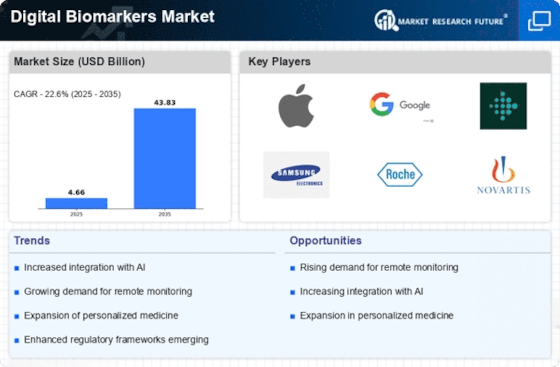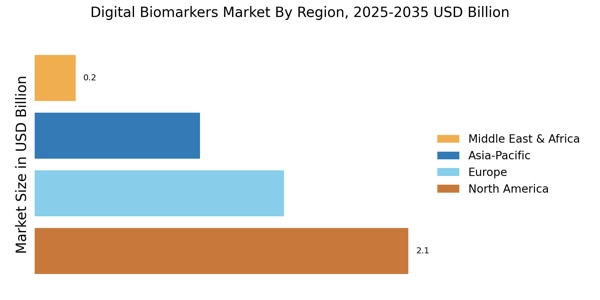Integration of Big Data Analytics
The Digital Biomarkers Market is increasingly influenced by the integration of big data analytics, which enhances the utility of digital biomarkers. The ability to analyze vast amounts of health data allows for the identification of patterns and trends that can inform clinical decision-making. As healthcare organizations adopt data-driven approaches, the demand for digital biomarkers that can provide actionable insights is likely to grow. Recent studies suggest that The Digital Biomarkers Market is projected to reach USD 68 billion by 2025, indicating a robust interest in leveraging data for improved health outcomes. This integration not only supports personalized treatment strategies but also aids in population health management, thereby driving the expansion of the digital biomarkers market.
Regulatory Support and Frameworks
The Digital Biomarkers Market is benefiting from enhanced regulatory support and frameworks that facilitate the development and validation of digital biomarkers. Regulatory bodies are increasingly recognizing the potential of digital health technologies, leading to the establishment of guidelines that promote innovation while ensuring patient safety. For instance, the FDA has introduced initiatives aimed at streamlining the approval process for digital health devices. This regulatory clarity is essential for fostering trust among stakeholders, including healthcare providers and patients. As a result, the market for digital biomarkers is expected to expand, with more companies investing in research and development. The establishment of robust regulatory frameworks may also encourage collaborations between technology firms and healthcare organizations, further driving market growth.
Advancements in Wearable Technology
The Digital Biomarkers Market is experiencing a surge due to advancements in wearable technology. Devices such as smartwatches and fitness trackers are increasingly capable of collecting real-time health data, which can be utilized as digital biomarkers. This trend is supported by a report indicating that the wearable technology market is projected to reach USD 60 billion by 2025. As these devices become more sophisticated, they enable continuous monitoring of vital signs, physical activity, and other health metrics. Consequently, healthcare providers can leverage this data to enhance patient care and personalize treatment plans. The integration of these technologies into everyday life is likely to drive the demand for digital biomarkers, as consumers become more health-conscious and proactive in managing their well-being.
Growing Demand for Personalized Medicine
The Digital Biomarkers Market is significantly influenced by the growing demand for personalized medicine. As healthcare shifts towards individualized treatment approaches, the need for precise and reliable biomarkers becomes paramount. Digital biomarkers offer a unique advantage by providing continuous, real-time data that can inform treatment decisions tailored to individual patient profiles. According to recent estimates, the personalized medicine market is expected to reach USD 2 trillion by 2025, highlighting the increasing focus on customized healthcare solutions. This trend suggests that digital biomarkers will play a crucial role in the development of targeted therapies, thereby enhancing treatment efficacy and patient outcomes. The convergence of technology and medicine in this context is likely to propel the growth of the digital biomarkers market.
Increased Focus on Preventive Healthcare
The Digital Biomarkers Market is witnessing a heightened focus on preventive healthcare, which is reshaping the landscape of health management. As healthcare systems worldwide emphasize the importance of early detection and intervention, digital biomarkers are emerging as vital tools for monitoring health status and identifying potential health risks. This shift is reflected in the growing investment in preventive health technologies, with projections indicating that the preventive healthcare market could reach USD 300 billion by 2025. Digital biomarkers facilitate proactive health management by enabling individuals to track their health metrics and receive timely alerts about potential issues. This trend not only empowers patients but also alleviates the burden on healthcare systems by reducing the incidence of chronic diseases.

















